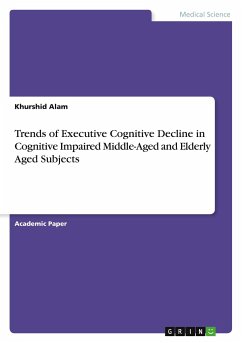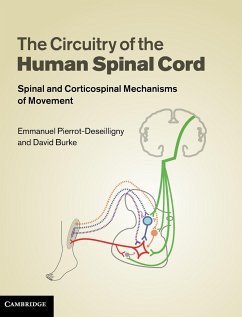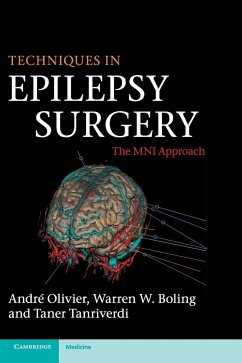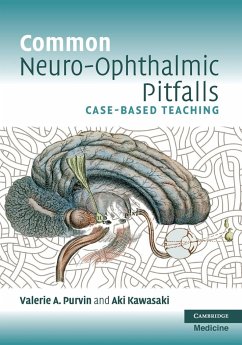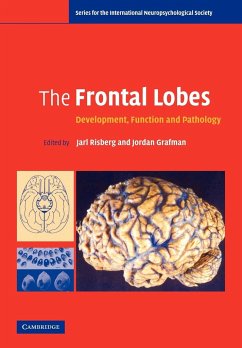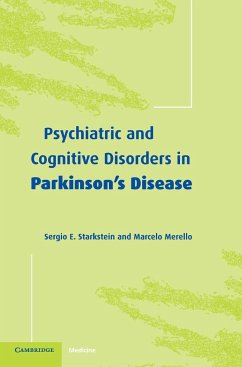
Cognitive Decline
Strategies for Prevention
Herausgeber: Fillit, H. M.; Butler, R. N.
Versandkostenfrei!
Versandfertig in 1-2 Wochen
47,99 €
inkl. MwSt.

PAYBACK Punkte
24 °P sammeln!
This book examines the ageing brain, whether or not such decline is inevitable and practical steps which can be taken to prevent or minimise cognitive decline in late life.Cognitive Decline - Strategies for Prevention examines the problems associated with our understanding of the ageing brain, whether or not such decline is inevitable and if there are practical steps which can be taken to prevent or minimise cognitive decline in late life. Preventive medical strategies have primarily targeted the top three causes of death in the developed world: heart disease, cancer and stroke. Less attention...
This book examines the ageing brain, whether or not such decline is inevitable and practical steps which can be taken to prevent or minimise cognitive decline in late life.
Cognitive Decline - Strategies for Prevention examines the problems associated with our understanding of the ageing brain, whether or not such decline is inevitable and if there are practical steps which can be taken to prevent or minimise cognitive decline in late life. Preventive medical strategies have primarily targeted the top three causes of death in the developed world: heart disease, cancer and stroke. Less attention to date has been paid to cognitive decline and dementia, possible because the generally held view has been that little of nothing could be done to help them. Our knowledge has grown rapidly and it is becoming clear that preventative strategies are now viable. Cognitive Decline - Strategies for Prevention brings together a group of leading researchers to assess and make practical recommendations about the strategies currently available. The chapters assess how 'normal' cognitive ageing should be defined and what the genetic, medical, psychological and environmental factors are which can adversely affect optimal cognitive function in late life. It then examines how 'healthy living' strategies can be employed throughout life to prevent cognitive decline in later years and what are the research strategies which promise new approaches to prevention in the future.
Table of contents:
Preface; Acknowledgements; Contributors; 1. The clinical significance of normal cognitive decline in late life; 2. Normal cognitive development in adulthood; 3. Lifestyle risk factors for cognitive impairment; 4. Education and depression as risk factors for cognitive decline; 5. Physical activity and cognitive function in old age; 6. Vascular factors in cognitive decline; 7. Neuroendocrine factors; 8. Delirium and cognitive decline; 9. Intervening in age-related cognitive decline in late life; 10. Policy and research implications; Index.
Cognitive Decline - Strategies for Prevention examines the problems associated with our understanding of the ageing brain, whether or not such decline is inevitable and if there are practical steps which can be taken to prevent or minimise cognitive decline in late life. Preventive medical strategies have primarily targeted the top three causes of death in the developed world: heart disease, cancer and stroke. Less attention to date has been paid to cognitive decline and dementia, possible because the generally held view has been that little of nothing could be done to help them. Our knowledge has grown rapidly and it is becoming clear that preventative strategies are now viable. Cognitive Decline - Strategies for Prevention brings together a group of leading researchers to assess and make practical recommendations about the strategies currently available. The chapters assess how 'normal' cognitive ageing should be defined and what the genetic, medical, psychological and environmental factors are which can adversely affect optimal cognitive function in late life. It then examines how 'healthy living' strategies can be employed throughout life to prevent cognitive decline in later years and what are the research strategies which promise new approaches to prevention in the future.
Table of contents:
Preface; Acknowledgements; Contributors; 1. The clinical significance of normal cognitive decline in late life; 2. Normal cognitive development in adulthood; 3. Lifestyle risk factors for cognitive impairment; 4. Education and depression as risk factors for cognitive decline; 5. Physical activity and cognitive function in old age; 6. Vascular factors in cognitive decline; 7. Neuroendocrine factors; 8. Delirium and cognitive decline; 9. Intervening in age-related cognitive decline in late life; 10. Policy and research implications; Index.





